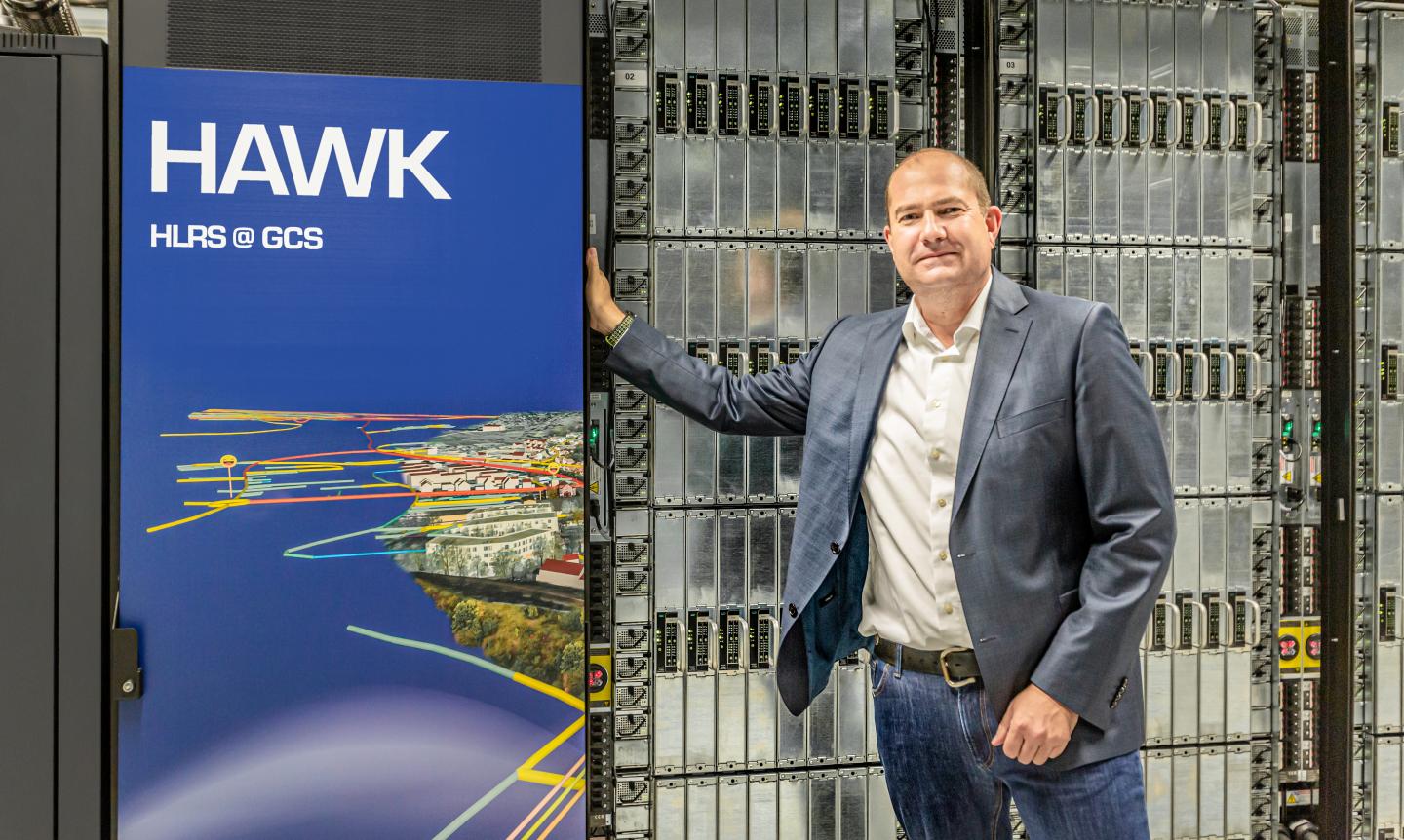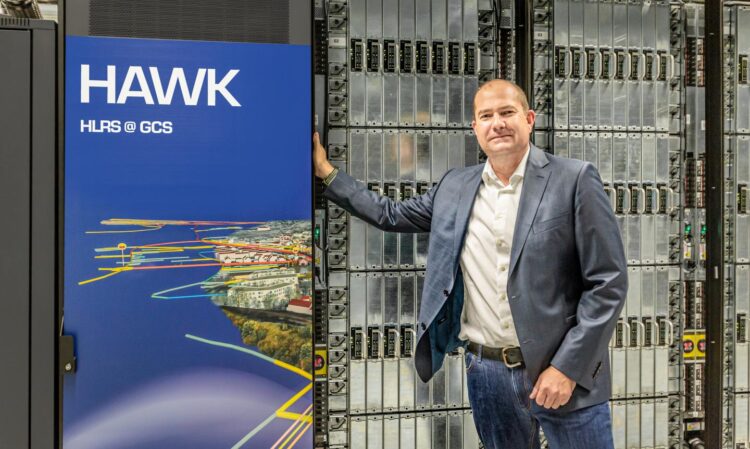The EuroCC and CASTIEL projects, coordinated by the Gauss Centre for Supercomputing, aim at creating a Europe-wide network of national high-performance computing competence centers.

Credit: Ben Derzian for HLRS
Today, the Gauss Centre for Supercomputing (GCS) celebrates the official kick-off of a new Pan-European effort aimed at creating a European network of national high-performance computing (HPC) competence centers. The initiative, encompassing 33 participating European states, will be coordinated by GCS member HLRS (High-Performance Computing Center Stuttgart). The EuroCC project, funded by the EuroHPC Joint Undertaking and 33 participating European states, will build a sustainable and globally competitive European HPC ecosystem. It will serve research and science in academia while also supporting industries in European member states with a particular focus on encouraging small and medium enterprises (SMEs) to turn to and exploit the advantages of HPC.
While the Gauss Centre for Supercomputing represents German participation in the EuroCC network, HLRS will set up a project management office (PMO) team to guide and coordinate the EuroCC efforts along with a related European project called CASTIEL (Coordination and Support for National Competence Centres on a European Level), an activity supporting the EuroCC project. The GCS centres Jülich Supercomputing Centre (JSC), the Leibniz Supercomputing Centre in Garching (LRZ) and HLRS partner SICOS GmbH are supporting the activities by leading subgroups of the project.
EuroCC is one of the first major projects to be supported by the EuroHPC Joint Undertaking, which was established in 2018. The EuroHPC Joint Undertaking marked the start of a new, Europe-wide approach to HPC investment by facilitating closer coordination of all participating states in the realms of infrastructure, technology development, and the development of advanced software. EuroCC will take this effort one step further by facilitating the development of a coordinated, integrated, high level of expertise across Europe in high-performance computing and related disciplines for science and industry, such as high-performance data analytics, classical simulation, and artificial intelligence.
To achieve this goal, each of the 33 member states will designate a national HPC competence center. These centers will be charged with auditing and expanding HPC competencies at the national level and identifying available expertise and knowledge gaps across the country. Over time, the competence centers will become national resources for identifying and coordinating technical knowledge, training resources, industrial outreach, and HPC services and tools for all computing centers in their home countries.
Approximately half of the funding of €60 million to support the creation of the competence centers is being provided by the EU, while the other half will come from the individual countries. Germany’s contribution is being financed by the Federal Ministry of Education and Research (Bundesministerium für Bildung und Forschung, BMBF). The project officially starts on September 1, 2020 and will last for two years.
In an effort supporting the EuroCC project, HLRS, together with GCS, Italian HPC center CINECA, the TERATEC consortium, the Barcelona Supercomputing Center, and the Partnership of Advanced Computing in Europe (PRACE), will lead a closely related coordination and support activity called CASTIEL. While EuroCC coordinates HPC expertise within each participating state, CASTIEL will lead activities to promote interaction and the exchange of expertise across the entire EuroCC network.
“EuroCC and CASTIEL have complementary goals,” says HLRS Managing Director Bastian Koller, who on behalf of GCS is leading the coordination of the two projects. “On the one hand, we hope that we will empower the participating countries to develop the expertise they need to become more technologically independent. On the other, countries that have already developed a broad base of expertise will also learn from these international interactions. By raising the knowledge level and improving communication across borders, we see a lot of potential to raise the productivity and impact of HPC all across Europe for academic research, industry, and public administration.”
###
About GCS:
The Gauss Centre for Supercomputing (GCS) combines the three German national supercomputing centres HLRS (High Performance Computing Center Stuttgart), JSC (Jülich Supercomputing Centre), and LRZ (Leibniz Supercomputing Centre, Garching near Munich) into Germany’s integrated Tier-0 supercomputing institution. Together, the three centres provide the largest, most powerful supercomputing infrastructure in all of Europe to serve a wide range of academic and industrial research activities in various disciplines. They also provide top-tier training and education for the national as well as the European High Performance Computing (HPC) community. GCS is the German member of PRACE (Partnership for Advanced Computing in Europe), an international non-profit association consisting of 26 member countries, whose representative organizations create a pan-European supercomputing infrastructure, providing access to computing and data management resources and services for large-scale scientific and engineering applications at the highest performance level.
GCS is jointly funded by the German Federal Ministry of Education and Research and the federal states of Baden-Württemberg, Bavaria, and North Rhine-Westphalia. It is headquartered in Berlin, Germany. For more information, please visit http://www.
About EuroHPC:
The EuroHPC Joint Undertaking was established by Council Regulation (EU) 2018/1488 in 2018. 32 European countries are currently taking part in the initiative and pooling their resources with the EU and private partners to enable the EU to become a world leader in supercomputing. The mission of the EuroHPC JU is to develop, deploy, extend and maintain an integrated world-class supercomputing and data infrastructure in the EU and to develop and support a highly competitive and innovative HPC ecosystem. The EuroHPC JU aims at equipping the EU by 2021 with an infrastructure of petascale supercomputers, precursors to exascale supercomputers, and developing the necessary technologies and applications for reaching full exascale capabilities around 2022 / 2023. For more information, please visit https:/
Press Contacts
GCS: Regina Weigand ([email protected])
HLRS: Christopher Williams ([email protected])
EuroHPC Joint Undertaking: Pauline Gounaud ([email protected] )
German Federal Ministry of Education and Research (BMBF): Daniela Schmidt ([email protected] )
Media Contact
Regina Weigand
[email protected]
Original Source
https:/





